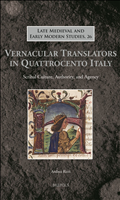Vernacular Translators in Quattrocento Italy : Scribal Culture, Authority, and Agency
246 p.
This book provides a richly documented study of vernacular translators as agents within the literary culture of Italy during the fifteenth century. Through a fresh and careful examination of these early modern translators, Rizzi shows how humanist translators went about convincing readers of the value of their work in disseminating knowledge that would otherwise be inaccessible to many. The translators studied in this book include not only the well-known 'superstars' such as Leonardo Bruni, but also little-known and indeed obscure writers from throughout the Italian peninsula.Rizzi demonstrates that vernacular translation did not cease with the rise of 'humanism'. Translations from Greek into Latin spurred the concurrent production of 'new' vernacular versions. Humanists challenged themselves to produce creative and authoritative translations both from Greek and occasionally from the vernacular into Latin, and from Latin into the vernacular. Translators grew increasingly self-assertive when taking on these ta
sks.The findings of this study have wide implications: they trace a novel history of the use of the Italian language alongside Latin in a period when high culture was bilingual. They also shed further light on the topic of Renaissance self-fashioning, and on the workings of the patronage system, which has been studied far less in literary history than in art history. Finally, the book gives welcome emphasis to the concept that the creation and the circulation of translations (along with other literary activities) were collaborative activities, involving dedicatees, friends, and scribes, among others. [Publisher's text].
Special access authorizations may apply; please contact us for further information.


